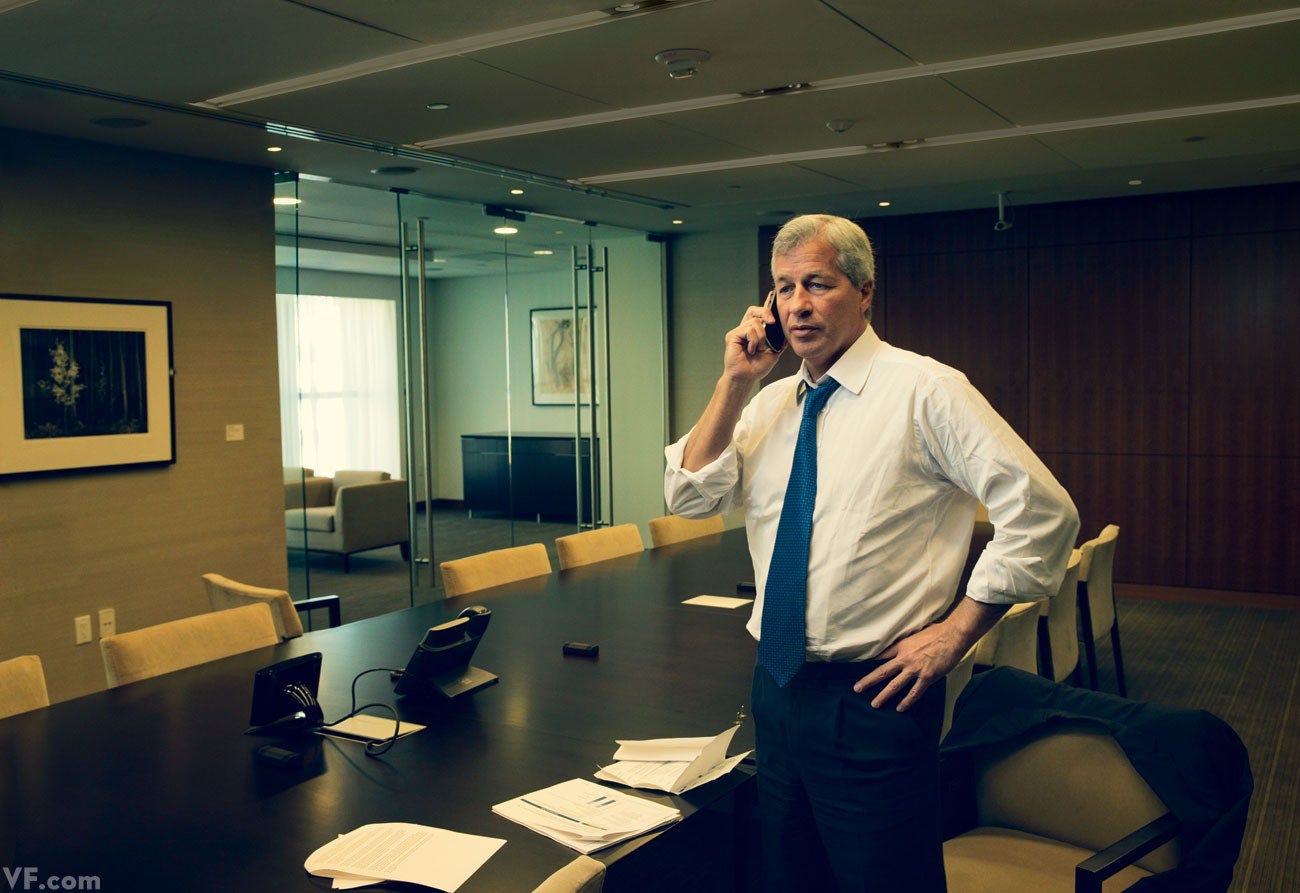Meet Wall Street's Longest Serving CEO
From a grad at American Express to a CFO at 30, we look back at the career of Jamie Dimon.
This week, JP Morgan CEO Jamie Dimon has been in the news relating to the fact that he will sell some of his shares in the bank next year. This would mark the first time in almost 18 years at the helm that he will do so.
Even though this is for "financial diversification and tax-planning purposes," there’s some element of Dimon reaching towards the end of his career. Given that it has been a remarkable one, we thought it appropriate to look back on it today.
Early life and career
Dimon was born on March 13, 1956, in New York City. His early life was marked by exposure to the world of finance from a young age. His father and grandfather were both stockbrokers, instilling in him an understanding of the industry's workings. His paternal grandfather was a Greek immigrant, who changed his name from Papademetriou to Dimon when he came to the US.
Dimon attended Browning School and later went on to study at Tufts University. He then went into management consulting at BCG for a couple of years, before heading to Harvard Business School.
It was after his MBA that he turned to banking, initially joining American Express. Yet after only a couple of years, he was persuaded by Sandy Weill to come as part of his takeover of Commercial Credit. This propelled Dimon to CFO aged just 30, and was the career leg up that he needed.
Turning to CEO status
After a stint at Citigroup, Dimon got his first CEO role in 2000 at Bank One. When this merged with JP Morgan a few years later, he took on the reins of CEO of the overall business in 2005.
When we consider that he’s still at the top of the tree at the bank in 2023, it has been a very long and successful tenure for Dimon.
It’s not easy to stay as the CEO of a top bank for any length of time, as the below graphic shows:
Top 3 significant events as CEO
Weathering the Global Financial Crisis (2008):
Perhaps the most pivotal event during Jamie Dimon's leadership at JPMorgan was the global financial crisis of 2008. As the crisis unfolded, JPMorgan Chase emerged as one of the relatively stable and well-capitalized banks in the midst of widespread turmoil. Dimon's strategic decisions and prudent risk management played a crucial role in JPMorgan's ability to weather the storm without needing a government bailout, a feat that significantly boosted the bank's reputation and solidified Dimon's status as a respected leader in the industry.
Acquisition of Bear Stearns and Washington Mutual (2008):
In a move that showcased Dimon's boldness and strategic vision, JPMorgan Chase acquired both Bear Stearns and Washington Mutual in 2008. The purchase of Bear Stearns, a troubled investment bank, was a pivotal moment in the early stages of the financial crisis, while the acquisition of Washington Mutual, one of the largest savings and loans institutions, was one of the most significant bank failures in U.S. history. These acquisitions expanded JPMorgan's reach and market share in the banking and financial services industry, cementing its position as a major player in the wake of the financial crisis.
Dimon and JPM catching the Bear…
Steady Growth and Record Profits:
Under Jamie Dimon's leadership, JPMorgan Chase has consistently reported strong financial results and record profits. Dimon's focus on prudent risk management, cost control, and a diversified business model allowed the bank to thrive in an ever-changing financial landscape. The bank's ability to adapt and grow in a highly competitive environment, while maintaining its reputation for stability, is a testament to Dimon's leadership and the resilience of JPMorgan Chase during his tenure.
Below we show the Earnings Per Share growth (blue) tracking the share price rise (candle bars) over the past few years:
Quotes from Dimon
"The mistake we made with homeownership was extending it to people who never should have owned a home."
Dimon acknowledges the role of the housing market and mortgage lending in the 2008 financial crisis. This quote underscores the importance of responsible lending and the potential consequences of extending homeownership to individuals who may not be financially prepared for the responsibilities and risks associated with it.
"It's not what you do, it's how you do it."
This simple yet powerful statement underscores Dimon's belief in the importance of ethics, integrity, and the way business is conducted. Even though some could argue some of JPM’s antics over the years have been less than ethical, Dimon has overall been seen as a clean CEO.
"Leadership is about making others better as a result of your presence and making sure that impact lasts in your absence."
Dimon's definition of leadership goes beyond traditional notions of authority and decision-making. He highlights the transformative aspect of leadership, where effective leaders empower and inspire their teams to improve and grow. The lasting impact of leadership is seen in the continued success of the organization even when the leader is not present. Given his age, we think that he likely has another five years max before this quote can be applied to himself!








